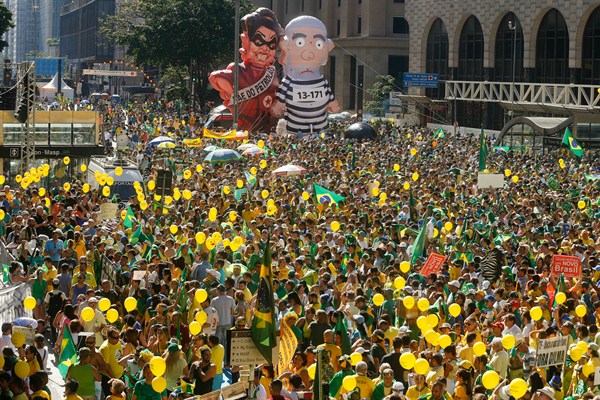The past year has been a tumultuous one for South America. The collapse in commodities prices, a series of corruption scandals and changing ideological tides have all combined to upend a lengthy period of prosperity and stability. In particular, the leftist ideologies that had been ascendant over the past decade and a half seem to be losing steam.
The following articles are free for nonsubscribers until May 19.
Brazil’s Crisis of Confidence
Amid Impeachment Saga, Will 2016 Be Another Lost Year for Brazil?
Writing in January, João Augusto de Castro Neves argued that while impeachment was unlikely in the short term, Brazilian President Dilma Rousseff remained vulnerable due to the accumulation of crises, including a corruption scandal at the state-owned oil company, Petrobras, and a severe recession. “Impeachment or no impeachment,” he concluded, “the outlook for Brazil is not very promising in the next couple of years, given the scale of both the corruption scandal and the obstacles to putting Brazil’s economy in order.”
Brazil is facing its most severe political crisis since its transition to democracy, with massive street protests, a government hobbled by corruption scandals and a president facing potential impeachment. But despite the focus on Rousseff’s political fate, popular frustration is directed at Brazil’s entire political class, Oliver Stuenkel wrote in March.
Venezuela’s Looming Meltdown
In January, Venezuela’s opposition assumed control of the country’s legislature for the first time since the late Hugo Chavez took power 17 years ago. The swearing-in ceremony, Frida Ghitis wrote at the time, “was a shambolic, sweltering and chaotic exercise,” foreshadowing a worsening political crisis made increasingly dire by economic troubles that could put pressure on Chavez’s successor, President Nicolas Maduro.
A series of crises at home, including a new plan to ration electricity, are not the only issues facing Venezuela, David Smilde wrote in April. Abroad, the regional coalition forged by Chavez is starting to unravel, complicating international relations for Maduro.
Argentina’s New Start
When Mauricio Macri won Argentina’s presidential election in November, he made it clear he would break with the politics of his predecessor, Cristina Fernandez. He quickly launched that process after taking office, and is now confronted with both an economic downturn and the continued looming presence of Fernandez, whose followers want her to return to power.
Macri inherited a host of problems to tackle during his time in office, notably Argentina’s flailing economy. But when it comes to foreign policy, “the international hangover of nearly 13 years of Kirchner governments looks relatively easy to fix,” Christopher Sabatini and Amy Williams wrote in January.
Regional Echoes and Trends
Uruguay has become known as a beacon of progressive ideals in Latin America, notably for legalizing marijuana and same-sex marriage. But political and economic challenges remain, Robert Valencia wrote in November, and it is uncertain whether the current administration will maintain this forward march.
In February, Bolivians rejected a referendum that would have allowed President Evo Morales to run for a fourth term, continuing a recent trend across Latin America of citizens voting for change. But Morales, who anticipated victory, did not factor in being overtaken by the region’s anti-incumbency wave, Eric Farnsworth wrote at the time.
The era of leftist governments that has been the dominant political phenomenon of the 21st century in Latin America is now entering its final chapter, Frida Ghitis wrote in December following the center-right Macri’s victory in Argentina. Macri’s stunning success sounded a wake-up call for the leftist governments still in power and offered hope to their political opponents, marking the beginning of a new rightward turn in the region.
For many observers, conservative electoral victories across Latin America last year were the last nail in the coffin for the region’s left, Robert Valencia wrote it January. But it’s too soon to declare the broader currents of the Latin American left dead, he argued, given the perseverance of more mainstream leftist governments and the persistence of socio-political and economic realities, like inequality, that historically drive support for the left.

